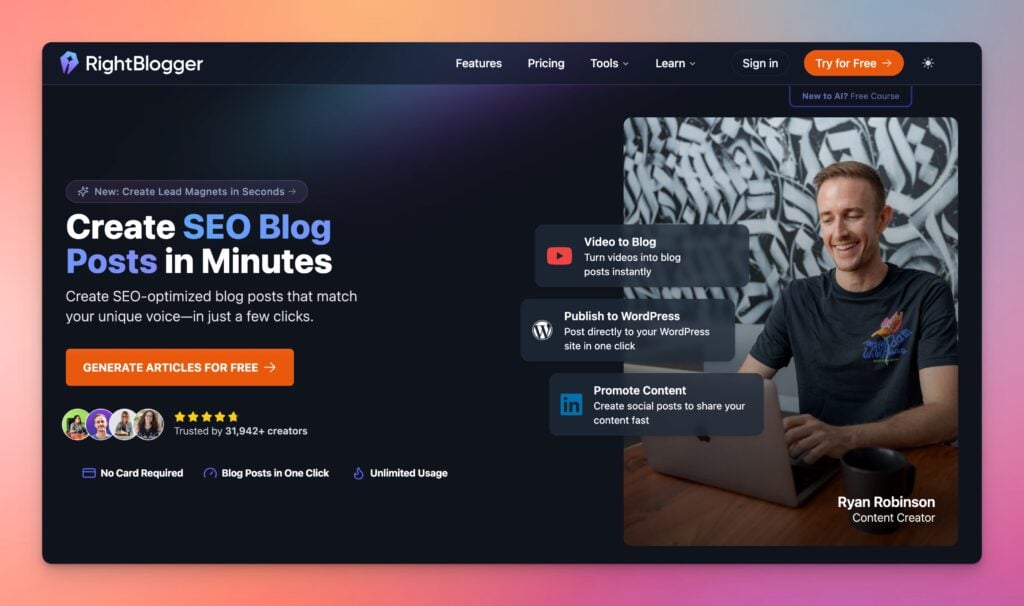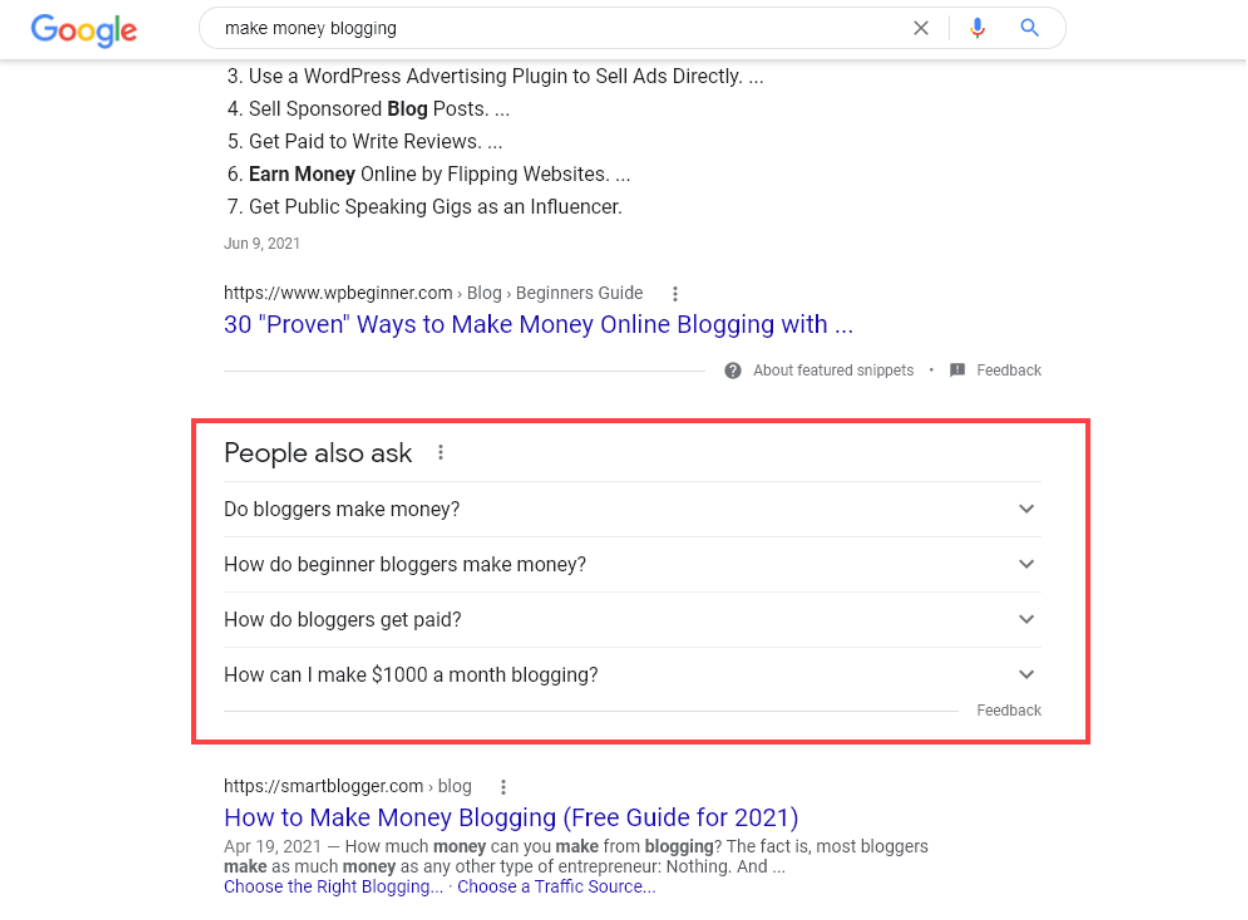What’s the best length for blog posts? How long should a blog post be in 2025?
Well, the ideal blog post length for most posts is between 1,500 – 2,500 words—and we’ll expand on that below.
These are the kinds of questions many bloggers, particularly new ones, grapple with. After all, if you don’t know whether you’re aiming for 500 or 5,000 words, it’s very hard to write a blog post.
The good news is, blog post length doesn’t need to be a great mystery.
I’ve written several hundreds of blog posts (of widely varying lengths) over the years. There are some tried-and-true principles I’ve learned along the way, I’ll be explaining them in this article.
We’re going to take a look at why post length matters, tackle a pervasive myth about post length, and look at the ideal blog length in different contexts.
How Long Should a Blog Post Be for SEO? 1,500 – 2,500 Words (Ideal Word Count) in 2025
- Why Does Post Length Matter Anyway?
- And the Ideal Blog Post Length Is…
- Post Length for SEO
- Post Length Based on Content Type
- How to Write Longer Posts…Without the Fluff
- Quality Content Wins, Every Time
Disclosure: Please note that some of the links below are affiliate links and at no additional cost to you, I’ll earn a commission. Know that I only recommend products and services I’ve personally used and stand behind. When you use one of my affiliate links, the company compensates me, which helps me run this blog and keep my in-depth content free of charge for readers (like you).
Create SEO Blog Posts in Minutes with RightBlogger

Join 31,942+ creators, bloggers, marketers, writers, freelancers & entrepreneurs in using my very own kit of powerful tools for content creation: RightBlogger. You’ll unlock 80+ blogging, SEO, marketing, sales and productivity-focused tools to create content faster & more effectively today. Plus, you’ll access our library of high-impact courses, a private community, and more.
Why Does Post Length Matter Anyway?
Some bloggers think posts should be any length you like. And let’s face it, your blogging platform probably doesn’t restrict you here. You could publish a post that’s 50 words long—or a post that’s 20,000 words long.
Realistically, though, readers have certain expectations about online articles. They’re definitely looking for something longer than a tweet or two…but they’re not planning on reading the equivalent of a short novel.
Your blog readers want your post to cover your topic quickly—but they want you to go into enough detail to make it worth reading.
For most topics, that means at least 1,000 words—but if you’re creating an in-depth guide, like my guide to starting a blog, you could be looking at well over 5,000 words.
Search engines aim to give readers the content they want—so long posts tend to do better in search. We’ll dig into this in more detail in a moment.
And the Ideal Blog Post Length is…
One huge myth is that short attention spans require short pieces of content.
You definitely don’t need to make all your posts 500 words or less to cater to busy online readers.
Instead, what matters is making your posts scannable.
That way, readers can easily find the information they’re looking for. This means using short paragraphs, bold text to emphasize key points, and subheadings to “signpost” the reader to different sections of your post.
Longer posts perform better in search results, which means longer posts are what readers want.
The ideal blog post length for most posts is 1,500 – 2,500 words.
How many words is too few? I’d recommend you try to avoid going under 1,000 words for any blog post.
Want to Start Your Blog (the Right Way)?
Check out my ultimate guide How to Start a Blog (on the Side).
Post Length for SEO

Readers like detailed content…and that means Google likes it too.
Back in the early days of money-making blogging, lots of bloggers aimed for 500 – 800 word posts because they were quick to write and they could publish something daily.
As blogging developed during the 2010s, long-form content became more and more popular, both with readers and with search engines.
For many keywords, the top 10 results in Google will all be around 1,500 – 2,500 words long.
Writing longer pieces means you can add more keywords (without making your piece sound unnatural). It allows you to give readers even more value, increasing the chance they’ll share and link to your post.
Plus, influential bloggers are more likely to link to in-depth resources than to short posts that only skim the surface. All of this can help with your SEO.
Post Length Based on Content Type
Of course, there’s no “perfect” post length. The right length depends on your niche and the type of content you create.
“The Ultimate Guide to Losing Weight” isn’t going to deliver on its promise if it’s only 500 words long. Equally, “Five Quick Tips to Cut Calories This Week” is going to have readers yawning halfway through if you spin it out for 5,000 words.
To work out how long your post should be, search for your primary keyword on Google and take a look at the top 5 posts.
How long is a typical blog post, when it comes to your topic? Figure out the average blog post word count, and aim to make your post a similar length.
In general, evergreen content will usually be longer than news-focused content—but this isn’t a fixed rule.
How-To Articles
How-to articles vary depending on their topic.
If you’re writing a guide about something pretty basic (like “how to change your admin email address in WordPress”) then that’s going to be quite a lot shorter than a guide with much more scope (like “how to start a freelancing business”).
How many words? Aim for 1,000 – 4,000 words, depending on the scope of the topic.
Listicles
Listicles (also called list posts) are hugely popular with both bloggers and readers. They’re easy to write and read.
On sites like Buzzfeed, listicles may consist of lots of images or gifs and not too many words—but most bloggers will be producing list posts that are more in-depth. Super long lists can be overwhelming for readers, though.
How many words? Aim for 2,000 – 2,500 words, depending on how long your list is.
Articles for Lead Generation
Detailed, well-researched posts help position you as an expert. They give readers true value, and that encourages people to sign up to hear more from you.
HubSpot found that the posts that generated their most leads were just over 2,500 words long, on average. This was higher than the most popular posts on their blog, at 2,100 – 2,400 words.
How many words? Aim for around 2,500 words.
Pillar Posts (or Ultimate Guides)
Pillar posts (often in the form of “ultimate guides”) are a particular type of evergreen post. They aim to be an in-depth guide to a big subject area, such as a whole category on your blog, within your niche.
Usually, they’ll link to a number of your other posts on that topic, acting as a hub on your blog. These are the types of posts that get linked to and shared a lot.
How many words? Aim for around 4,000 words.
Remember, you don’t have to hit these length recommendations every time. Think of them as an average blog post word count. Some of your posts will be a few hundred words longer, some will be a few hundred words shorter.
How to Write Longer Posts… Without the Fluff

What if your blog posts are normally 800 – 1,000 words? You want to make them longer, so you can provide more value to readers and improve your SEO, but how exactly should you go about it?
Some bloggers talk about “fluff” (or “padding”) to mean wordy content that doesn’t add value. Saying the same thing over and over again, or using loads of words to convey a simple concept, is fluff.
It’s annoying for readers, meaning they might head straight back to their search results to choose a different post, which could see your page being ranked less favorably by Google.
Instead, when you’re trying to lengthen a draft or rewrite an existing post to make it longer, you can:
Add More Items to Your List Post
A really easy way to make a list post longer is to simply add more items to your list. “Ten Ways to…” could become “Twenty Ways to…” —doubling the length.
Of course, you don’t want to pad out your list with weak examples. Make sure that the new items you add are just as good as the ones already on the list. If you’re struggling, try one of these other techniques to add to your list instead.
Include More Examples
One easy way to add value and length to a post that gives advice is to include more examples. Depending on your topic, these could be:
- Examples from your personal experience.
- Quotes from other bloggers, books, news articles, or other resources.
- Screenshots or photos, and a written explanation of them.
- Case studies from clients you’ve worked with—a great way of marketing your services.
- Links to products or services—this can be a good opportunity to include affiliate links.
For instance, if you have a post on “how to pick a blog niche” you could add examples of well-known blogs succeeding in different niches.
Add More Detailed Advice
Sometimes, you might give a brief overview of how to do something in your post. To make your post longer (and more valuable), you could go into greater detail. That might mean:
- Giving step by step instructions instead of a one-paragraph summary.
- Suggesting different ways in which readers could use your tips.
- Giving warnings about common mistakes or misconceptions.
- Sharing lessons learned from your own experience.
- Explaining when your advice doesn’t apply or who shouldn’t use it.
Give Tips for Going Further
If your post is aimed at beginners, you could add extra advice for readers who want to go further. This could be an extra “tip” for different parts of the post, or a suggestion on “Going further” or “Next steps.”
Another approach to this is to give a “recommended resource” for each part of your post, and explain why you’re suggesting that particular resource.
This can be a great way to link to your other blog posts—or to promote your products or services. You could also link to other bloggers or to resources you’re an affiliate for.
Answer Frequently Asked Questions (FAQs)
To find some great questions to answer, search for your keyword on Google and look for the “People always ask” section. For instance, here’s what comes up for “make money blogging”:

Answering these questions may help your post get more search engine traffic.
Snippets from different posts appear when a user clicks on one of those questions to see an answer, and your post might end up becoming one of the ones featured here.
It often makes sense to put your FAQs section near the end of your post, so readers can easily skip it if the questions aren’t relevant to them.
Quality Content Wins, Every Time
Ultimately, what really matters isn’t your word count. It’s the quality of your content.
Thoughtful, detailed, well-researched content will always win out over slap-dash content that simply repeats a few basic tips.
Aim to make your posts roughly 1,500 – 2,500 words: that’s the best length for blog posts, generally.
If it’s a straightforward topic, 1,000 words is fine. (And it’s okay to include even shorter posts from time to time, too.)
If it’s a big topic, feel free to make your post as long as you like—just make sure your post is well-structured so readers can easily engage.
Whatever your blog post length, you need to be creating the best content you can. Start with a strong blog post outline—and it should all fall into place from there.
Want to Start Your Blog (the Right Way)?
Check out my ultimate guide How to Start a Blog (on the Side).

40 replies to “How Long Should a Blog Post Be for SEO? The Ideal Word Count in 2025”
Thank you for sharing this profound article!
Hope will try to implement the same in our work too!
you’re welcome! I’m rooting for ya
thoughtful and detailed
I appreciate you!
Thank you for this article. It’s effortless to learn something new about it. This was an informative post for us. I would like to keep sharing these articles with others.